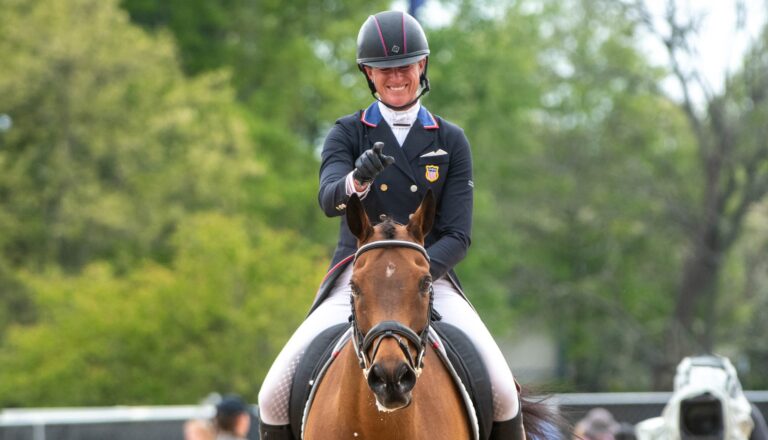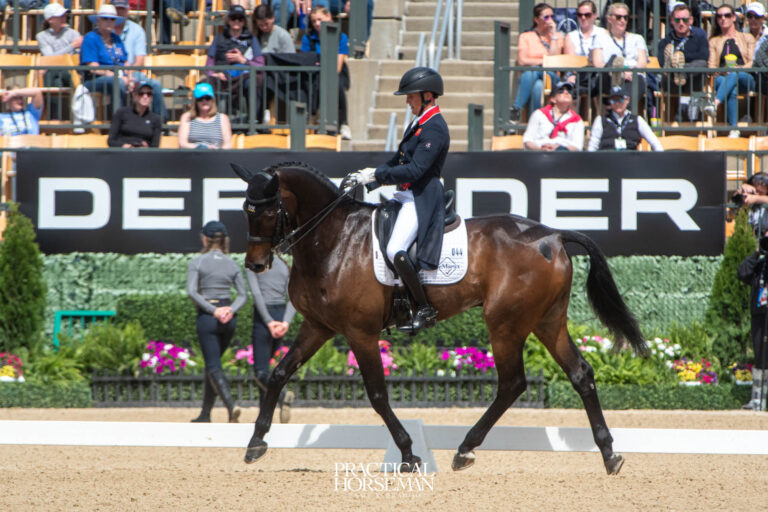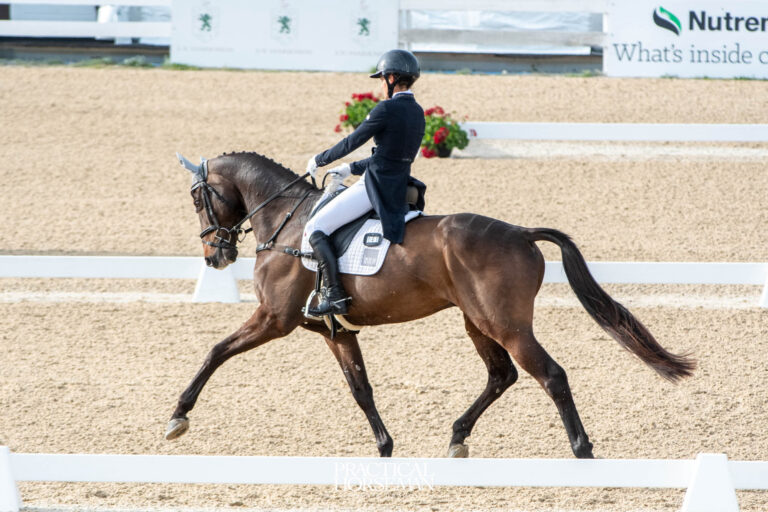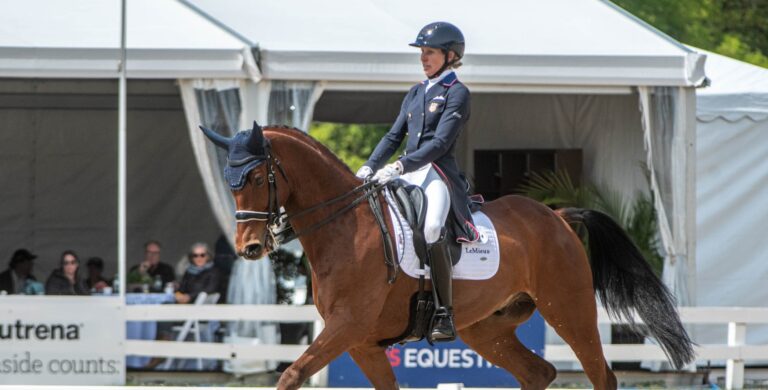During a year when five-star eventer Elisa Wallace’s top-level horses were injured, she used the time to check off a bucket list item—to train a mustang. A friend of Wallace’s signed her up for a mustang makeover competition. Wallace thought it would be a good opportunity to demonstrate her skills and promote herself as a trainer.
“I was not planning on keeping him. I mean, I’m a three-day eventer, what am I going to do with a 13.3-hand mustang?” said Wallace. “But then about 30 days in, the thought of him leaving me brought me to tears.” That mustang was Fledge, and Wallace decided to keep him.
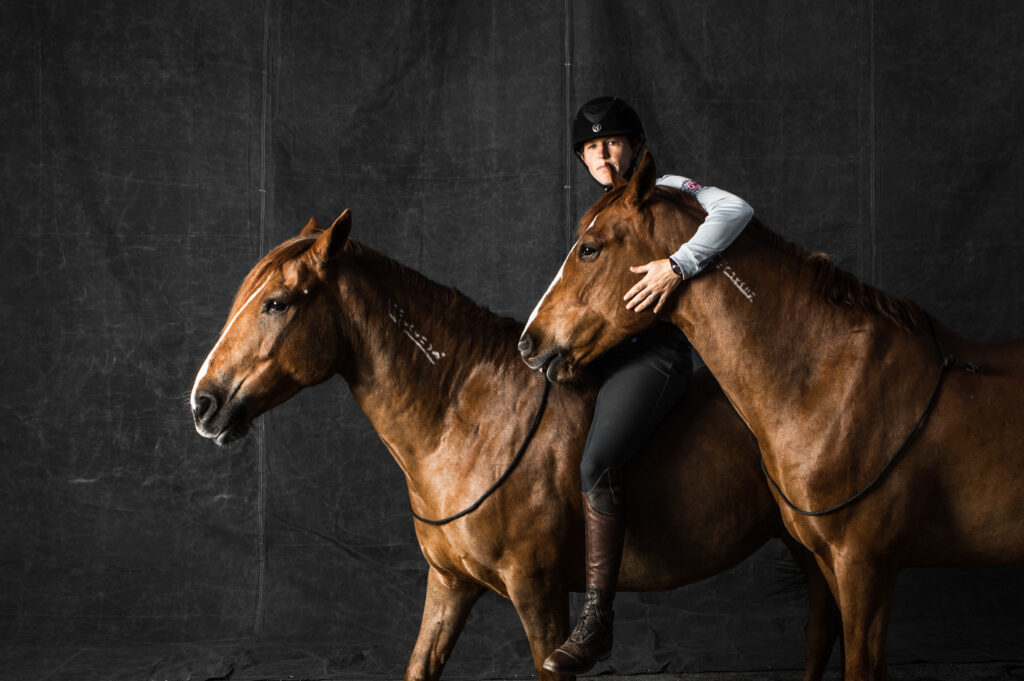
Fast forward to present day, Wallace is the the proud owner of five mustangs. And she plans to add one more to the family to compete in the 2024 Mustang Classic.
An expert on mustangs, Wallace shared her personal experience with these versatile and adaptable horses.
How do you pick a mustang?
For me, I always look for an uphill-type horse with a longer neck. Of course, I want to have the legs put on correctly because I’m looking for all the soundness-type things. It can be very difficult though, because when you go to the facilities or some of the satellites (Bureau of Land Management adoption events), the horses can only walk. So, it’s kind of based on your gut feeling and really being able to read conformation and envisioning what those horses can do.
What has your experience been with gentling mustangs?
It’s a very special moment when you get that first touch. It’s a bit the addiction part, too. So you have to also watch that you don’t get greedy. You get that first touch and you’re like, “OK, I want more,” but each horse has his own timescale.
It’s always interesting to me when that horse that’s scared and thinks it’s going to die—and they are scared—and you can kind of empathize with them and you can feel the switch. It’s really one of the best moments you get—that first touch and when they start to let you touch them in a relaxed way. Because there’s a lot of electricity in your touch. When you have a horse, they can bow up to touch or they can melt to the touch. So when you get that soft feel from them, it’s very much a momentous moment.
What are the mustangs typically like when you first get them?
I’ve had some that I was able to sit on them in 45 minutes. Generally, my average mustang that has a pretty nice brain on it, I can hop on it probably in three or four days.
But that’s kind of how I build my trust. I feel like once they let me up on their back—that is where they’re the most vulnerable, like predators getting on their back—once they can trust you to be there, I feel like the relationship builds a lot more. That’s the way that I use trust.
But on average, they’re not easy. They make you work for it. Just like with any barn you walk into where you have horses with degrees of difficulty, it’ll be the same with mustangs. Some make you feel like the best trainer in the world because everything can come easy, and then other ones make you feel like you know nothing.
I’ve had some really amazing mustangs, and I’ve had some really amazingly difficult mustangs. They’ve all taught me a lot, for sure. But for the most part, they really want to try. Once you get the trust of that mustang, they’ll try to do anything for you.
What disciplines do you think mustangs are good for?
They are all around! For instance, the little mare that I have for the Mustang Magic (a mustang makeover competition in January 2024)—she’s not going to be a high-level event horse, but she makes a great little low-level event horse. And then I can go take her out and she wants to chase cows, and she’ll go on a trail ride, or she’ll go in the dressage ring.
Almost all of mine are like that. They’re very versatile. And that’s been the fun thing—I can take my two chestnut boys, Fledge and Rune, and I can go do an eventing competition … but then I can go play with cattle sorting.
I think that’s what is really great—you really can do anything with them. I know there have been some amazing ones that have been doing the Tevis Cup for endurance. They tend to be stereotyped as a Western-type horse, but they’re really good movers and great little jumpers. I had someone ask, “Well, do you think they can jump?” and I was like, “Well, we have to have six-foot panels [on the paddocks] for a reason!”
Now, for the Advanced level of eventing, it can be a little tougher, because while they can do the height, the width sometimes gets some of them. But I have my little paint mustang, Wyeth, and he’s very scopey. He’s been schooling the Preliminary level. And then my mustang mare, Hwin, she competed up to the Preliminary level, too.
So they’re very athletic types of horses. That’s where they can appeal to a lot of people, especially in eventing. A big group of the riders and competitors are in the Training level and below, so that’s a big gap, and those mustangs fit perfectly for being competitive in that group.
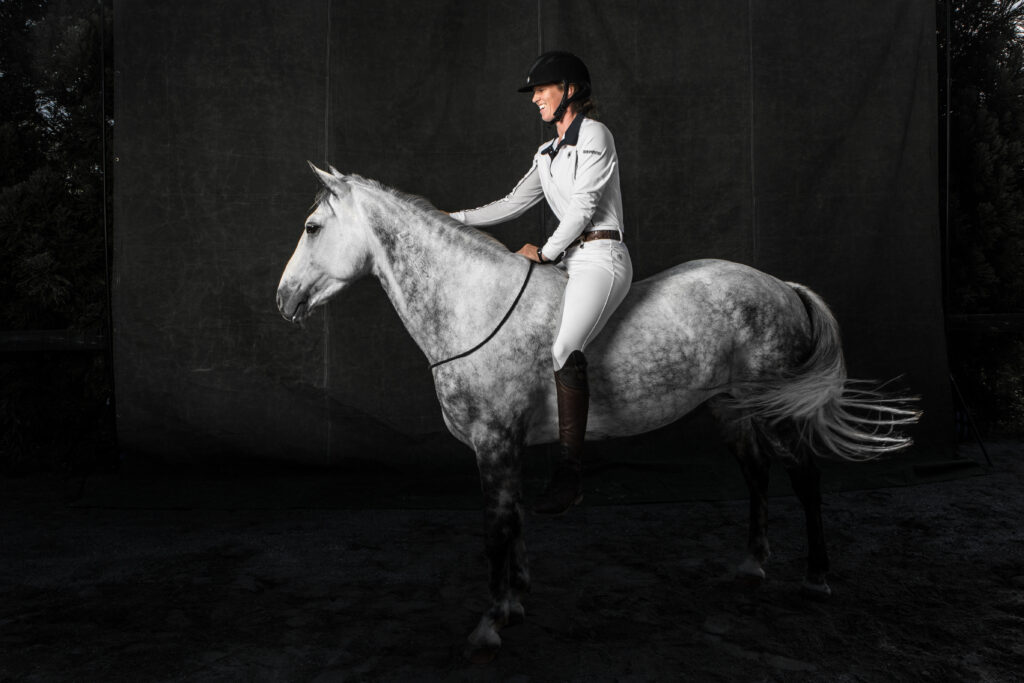
What would you say to encourage people to adopt or purchase a mustang?
The thing about mustangs is—they will change your life in some way. If you’re looking to deepen your experience with horses in learning about connection and going up a level in learning about horses in general—mustangs are amazing teachers. They also teach us a lot about ourselves. If you want to have experiences that help you be better, then mustangs are an amazing way to go.
Do you plan to participate in the 2024 Mustang Classic?
Yeah, I’m going to give it a shot. I couldn’t miss this. It’s definitely on the docket to do. I don’t have a horse yet; the deadline is June 1, 2024. So that still gives [me] a fair bit of time to train the horse for [the Mustang Classic] in September.
How do you think training mustangs has impacted you as a horseperson?
They have really expanded and opened my horizons. I always think it’s important to learn through different disciplines … and kind of push myself outside of my box. It’s been really great having the mustangs because they do a good job of grounding us a little bit. That’s what I really like about doing them.
To read about dressage and eventing trainer Chelsea Canedy’s mustang experience, click here.
For everything you need to know about the 2024 Mustang Classic, click here.
To visit the official Mustang Classic website, click here.
To read the official Rules and Regulations of the 2024 Mustang Classic, click here.





